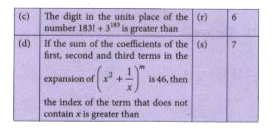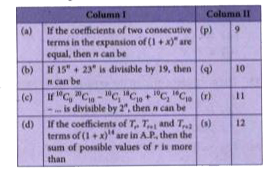Complete Solutions to TEST YOURSELF (Multiple Choice Questions) OLYMPIAD AND NTSE LEVEL EXERCISES of chapter BINOMIAL THEOREM of Class 10 book with complete answers and questions
| Class 10 | MATHS |
| Chapter | BINOMIAL THEOREM |
| CENGAGE | TEST YOURSELF (Multiple Choice Questions) OLYMPIAD AND NTSE LEVEL EXERCISES |
| Number Of Questions | 10 |
| Academic Year | 2023-24 |
If `rth and (r+ 1)`th terms in the expansion of `(p + q)^(n)` are equal, then `((n+1) q)/( r (p+q))` is
View SolutionIf the coefficients of `T_(r) , T_(r+1) and T_(r +2)` terms of `(1 +x)^(14)` are in A.P., then `r=`
View SolutionThe ratio of the coefficient of `x^(15)` to the term independent of `x` in the expansion of `(x^(2) + (2)/(x) )^(15)` is
View SolutionThe approximate value of `(1.0002)^(3000)` is
View Solution`10^(n) + 3(4^(n+2) ) +5` is divisible by `( n in N)`
View SolutionIf `n` is an odd natural number, then number of zeros at the end of `99^(n) +1` is
View SolutionIf the three consecutive coefficients in the expansion of `(1 + x)^(n)` are 28, 56 and 70, then the value of `n` is
View SolutionThe number of integral terms in the expansion of `(5^(1//2) + 7^(1//6) )^(642)` is
View SolutionMatch the given columns:


View SolutionMatch the given columns:

View Solution
TEST YOURSELF (Multiple Choice Questions) OLYMPIAD AND NTSE LEVEL EXERCISES questions and complete solutions for chapter BINOMIAL THEOREM of CENGAGE of Class 10